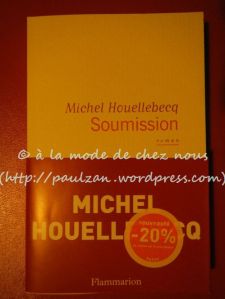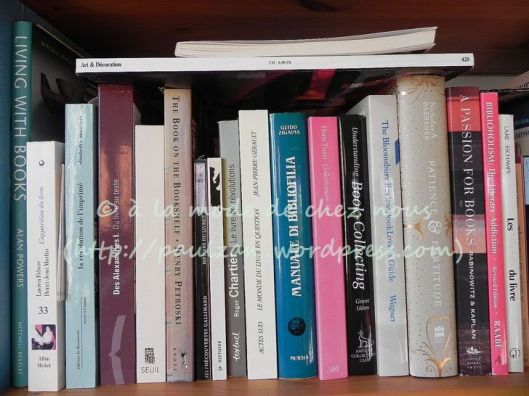PLEASE NOTE THAT I EXPERIENCED A GENUINE EPIPHANY EARLY SEPTEMBER LAST YEAR WHEN I ATTENDED A LITERARY CONFERENCE. AS A RESULT OF THIS AND OF SUBSEQUENT EVENTS OF A GEOPOLITICAL NATURE, I AM NOW FULLY AWARE OF THE DARK FORCES AT PLAY THROUGHOUT THE WORLD, FORCES WHICH ARE BENT UPON STIRRING UP HATRED BETWEEN THE RELIGIOUS COMMUNITIES. ALTHOUGH I AM ASHAMED THAT I FELL PREY TO THESE VERY FORCES, AND I AM THUS ASHAMED BY THE SAME TOKEN OF THIS VERY ENTRY, I HAVE DECIDED TO LEAVE IT ONLINE JUST SO AS TO ILLUSTRATE THAT ENLIGHTNMENT IS POSSIBLE WHEN ONE REALISES THE EXTENT TO WHICH ONE IS BEING MANIPULATED (THROUGH THE MASS MEDIA MAINLY) ON A DAILY BASIS. THE ONLY CHANGES I MADE TO THE TEXT ARE AS FOLLOWS: INSERTION OF ‘[sic in the text]’ AND SHIFT OF THE COMMA JUST BEFORE THIS COMMENT. DATED 4TH MARCH 2016.
The specificity of literature, the major art of a West which is nearing its demise before our eyes, is not very difficult to define, however. As much as literature, music can produce an emotion or a shift in emotion, sadness or absolute ecstasy; as much as literature, painting can generate amazement, a new look at the world. But only literature can give you this sensation of contact with another human mind, with the whole of this mind, its weaknesses and grandeurs, its limitations, its pettinesses, its obsessions, its beliefs; with everything that moves this mind, interests it, excites it or repels it. Literature alone can allow you to get in touch with the spirit of a dead person, more directly, more fully and more deeply than would the same conversation with a friend — however profound, however lasting a friendship may be, never does one reveal oneself, in a conversation, as fully as is done in front of a blank sheet when writing to an unknown recipient.
Michel Houellebecq, Soumission, Flammarion, Paris, page 13 [my translation]
 On Wednesday evening, I felt I needed to read something other than a newspaper on my way back to Lausanne. As I could not find Magazine Littéraire in either of the two newsagents I went in at Cornavin railway station, I decided to try my luck at Payot after I had caught sight of the bookshop’s name on the escalator leading to the trains – after all, I had not yet set foot in the new outlet of what is now a totally independent and locally owned bookshop chain and I felt that if I had to spend money on literature I might as well give them my business (rather than have it go to a foreign group owned by some billionaire). Among the books displayed prominently on the wall just opposite the entrance, I spotted several copies of Michel Houellebecq’s latest novel, ‘Submission’, published only a fortnight earlier. I bought the novel, I read it on the train, then on the métro and finally at home. I finished it a couple of hours later.
On Wednesday evening, I felt I needed to read something other than a newspaper on my way back to Lausanne. As I could not find Magazine Littéraire in either of the two newsagents I went in at Cornavin railway station, I decided to try my luck at Payot after I had caught sight of the bookshop’s name on the escalator leading to the trains – after all, I had not yet set foot in the new outlet of what is now a totally independent and locally owned bookshop chain and I felt that if I had to spend money on literature I might as well give them my business (rather than have it go to a foreign group owned by some billionaire). Among the books displayed prominently on the wall just opposite the entrance, I spotted several copies of Michel Houellebecq’s latest novel, ‘Submission’, published only a fortnight earlier. I bought the novel, I read it on the train, then on the métro and finally at home. I finished it a couple of hours later.
The subject matter is simply incendiary: ‘Submission’ (or ‘Soumission’ in French) describes the life of a disillusioned and promiscuous university lecturer in French literature, François, against the backdrop of the rise to the country’s presidency of a ‘moderate Muslim’ [sic in the text], Mohammed Ben Abbes, through a Socialist-Muslim Brotherhood alliance. The country’s secular school system is Islamised and the new president quickly launches a Mare Nostrum policy. After a failed attempt to renew with his Christian roots during a brief stay at a monastery, François, in order to reintegrate university teaching and to continue to be able to enjoy young flesh, decides to convert to Islam at the very end of the novel, hence the title ‘Submission’.
Although I closed the book with a faint feeling of nausea, as the ending of ‘Submission’ somehow reminded me of George Orwell’s 1984 in that both François and Winston Smith ‘willingly’ submit to the forces of totalitarianism, I nevertheless enjoyed the way in which the plot of the novel parallels the spiritual quest of the 19th century French author Joris-Karl Huysmans, on which François wrote his doctoral thesis and to whom he constantly refers throughout ‘Submission’. More than that, and so as to steer away from any controversial issues and thus move to a less depressing topic, I simply loved the fact that literary scholarship is another important theme in the novel, even though Michel Houellebecq uses it as kind of cautionary note that there is no escaping politics, even for those who feel safe in their ivory tower…
I have used the word ‘scholarship’ rather than ‘academic life’ because of the former’s etymological connection with the Latin word ‘schola’, itself derived from the Greek term ‘skholē’. Given that Latin was the language of the Roman church, which set up the first schools in the Middle Ages (after the disappearance of their equivalents in the Roman and Greek worlds with the disintegration of the Roman empire), the Latin word ‘schola’ ended up being used to describe this institution in most European languages: ‘école’ (French), ‘Schule’ (German), ‘scuola’ (Italian), ‘escuela’ (Spanish), ‘escola’ (Portuguese), etc. Incidentally, Joris-Karl Huysmans, Houellebecq’s quasi double in ‘taedium vitae’ (weariness of life), was well versed in Latin and its literature:
[…] I prefer the language of the Vulgate* to the language of the age of August, or even to the Latin of the Decadent Period, however more intriguing I find it with its smell of cooked waterfowl and its parsley shades of venison. To me, the Church, which, after having disinfected and rejuvenated Latin, created, to deal with an order of hitherto unexpressed ideas, grandiloquent vocables and diminutives of exquisite tenderness, seems to have fashioned itself a language far superior to the dialect of Paganism[…].
Preface to Joris-Karl Huysmans’s novel Against the Grain [À rebours], which he wrote 20 years after the novel was first published [my translation; the text in French is available here.]
The cult of instant gratification so prevalent in our times, whether it is achieved through watching televised sport, through a voyeuristic prying into flesh-flashing celebrities or, in a quasi Pavlovian fashion, as a result of the notification that somebody has liked one of our comments or pictures on social media, certainly seems at odd with the calm and patience one would associate with the reading of literature or the pursuit of literary scholarship.
As is the compiling of dictionaries of medieval Latin, a language which had been at the heart of the Christian West for so many centuries, by a group of British enthusiasts over nearly a century:
On this point, I would certainly agree with Mr Houellebecq that the West is nearing its demise, being so infatuated with the present, being so oblivious of its own cultural traditions and achievements.
* revised version of the Bible produced by St Jerome based on the original texts as well as on his revisions of the texts translated into Latin from Greek; more here.
Links to (mostly positive) reviews of Michel Houellebecq’s Soumission:
- The really shocking thing about Michel Houllebecq’s Soumission, David Sexton, The Spectator, 17 January 2015
- Michel Houellebecq’s Soumission ‘More prescient than provocative’, Gaby Wood, The Telegraph, 15 January 2015
- French fiction: Michel Houellebecq, Irrepressible, The Economist, 10 January 2015
- Submission (Soumission) by Michel Houellebecq, theuntranslated.wordpress.com, 9 January 2015
- Michel Houellebecq’s Submission: Author says novel imagining Muslim-run France is not Islamophobic scare story, The Independent, Lizzie Dearden, 5 January 2015
- Scare tactics: Michel Houellebecq defends his controversial new book, The Paris Review, Sylvain Bourmeau, 2 January 2015 [interview with Michel Houellebecq]

